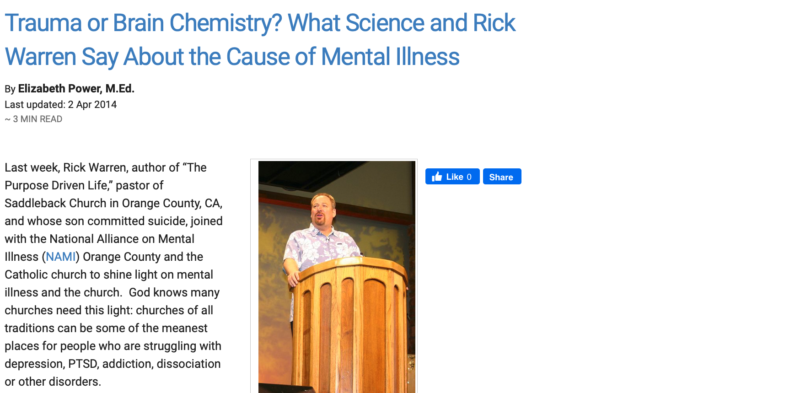The real roots of mental illness

The real roots of mental illness
April 3, 2014 Comments Off on The real roots of mental illnessBut no matter how comfortable it is, no matter how much Warren, Venn, NAMI or Big Pharma, or anyone wants it to be THE cause, it’s not.
The facts are clear: the majority of people in treatment for substance use have histories of childhood trauma. And as many as 90% of the people receiving care in the public system have histories of childhood trauma, most notably abuse and neglect. An even bigger truth is that there are lots of things in addition to abuse and neglect that overwhelm children-and parents – leading to what is frequently diagnosed as mental illness.
And that, Pastor Rick, NAMI, and Bishop Vann, is something you desperately need to add to your beliefs. Traumatic experiences before birth, after birth, growing up-all change how we respond to ourselves and others, and rewire the brain. For generations.
There’s a whole body of Christians out there, and many people of other faiths, who are or have been diagnosed with mental illness and are disenfranchised because of their religion’s primary erroneous belief that brain chemistry alone shapes illness. It’s easy and it’s safe: when we settle for “chemistry in the brain” we can overlook so many things that Pastor Rick Warren and Bishop Kevin Venn would call sinful whether they are sins of omission or commission.
This perspective allows us to turn away from what is uncomfortable. And yet it continues to disregard the truths that a pill isn’t always the answer, that the easy culprit of a chemical imbalance isn’t always at the root of illness, and that the messy lives we lead or the messy experiences into which we are thrown are so often at the root of a mental health diagnosis. In any organization, the way in which we continue to turn towards health through prescription and practice reshapes our lives.
I watched Rick’s speech after the death of his son — torn between two opposing responses: One response was compassion for his loss. The other response was simple anger. Anger because, whether he knew it or not, he was spreading falsehoods.
There are three layers of falsehood he spread in that speech: The first is the story that his son died because he had an issue with chemicals in his brain (instead of the chemicals in his brain showing evidence of the issues in his life.) The second is the story that false grace touting, shame and judgment infused, “Purpose-driven lives,” adhering to rules and goaded by a fear of the wrath of a suspiciously human-looking god had nothing to do with the depression and then self-induced death of his son. The third is the assumption that “Oops, we just messed up the only cure — drugging him.”
And the truth?
The truth is that many people do need drugs — and many don’t. But, almost all of those who need drugs need them only temporarily. They need them to mask the pain just enough to allow them to deal with their hearts and fix the real problem: How badly they have been hurt and how dark what they believe about themselves really is.
So often, when evangelical mood disorders strugglers finally grasp the core message of all-out-war on religion that Christ came to launch and the magic of what he came to replace that decaying system with, they can cry for weeks. It’s quite remarkable what happens to levels of depression when the sufferer walks away from hating the self, feeling condemned, fearing punishment, hiding from others and desperately trying to look good while shredding the self with anger turned inwards.
The tears?
They are tears of freedom to live, freedom to finally admit to the harm and freedom to simply grieve. It’s how the human heart heals — with or without a chemical lift to get things started…